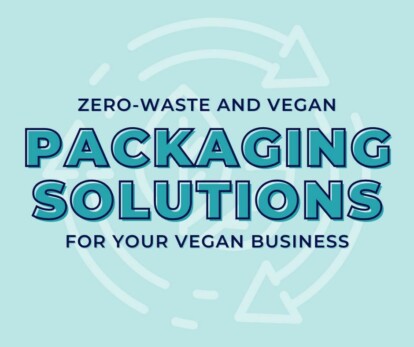Dr. Shireen Kassam, Founder of Plant-Based Health Professionals UK


If you create and sell your own products as a vegan business, then finding the right packaging solutions is a priority.
To rise to the dual challenge of maintaining your ethical standards at the same time as addressing environmental concerns, you can’t necessarily pick the easiest or most widely used option.
Traditional packaging methods often contribute to waste and pollution, undermining the principles of sustainability and compassion that vegan businesses stand for. In addition, many packaging materials and processes include products derived from our animal kin, which means they aren’t vegan.
In today’s blog, we’ll be exploring zero-waste packaging solutions that are not only biodegradable and recyclable but also align with the vegan ethos, ensuring your business can thrive without compromising its values.
The Earth only has a finite number of resources, or perhaps more accurately, it has resources that humans are using faster than nature can replenish them.
The zero-waste movement wants us to move away from a linear take-make-use-waste model to a circular model where we take-make-share-maintain-reuse-redistribute-remake-recycle-regenerate with little to no waste and plenty of replenishment. Ultimately, this will keep precious resources out of landfills and give us a fighting chance of addressing the climate crisis.
For vegan businesses, zero-waste packaging aligns with the broader commitment to minimising harm to animals and the environment.
This is because traditional packaging materials, such as plastic, not only contribute to pollution but also often involve animal-derived components in their production processes, making them unsuitable for vegan enterprises.
When selecting packaging solutions, you should consider the factors below to ensure that every detail aligns with your vegan and eco-conscious values:
You will need to think beyond the main packaging material you plan to use.
Packaging adhesives are often made from animal-based gelatine and even some lubricants used on production machines may contain animal fat. Some label glues are made using bone or casein (milk protein), while the inks on packaging may include animal bone char, glycerin from animal fat, gelatine from hooves, or shellac from beetles.
This is why checking and understanding every step of the manufacturing process is important.
As a growing number of people recognise how harmful packaging can be for the environment, there’s a burgeoning demand for innovative new packaging materials and methods that are good for the environment and for our fellow animals.
Some of the solutions that you might want to explore for your own products include:
When people talk about bioplastics, there can be some confusion because the term can include products that are either biobased, biodegradable or feature both properties (INGREEN has a handy diagram with more information).
Today, we’re specifically talking about the crossover between biobased and biodegradable, covering compostable bioplastics entirely made from renewable plant-based materials.
Bioplastics look, feel, and behave like petroleum-based plastics. Sustainability for All says they are likely to account for 10% of the European plastics market within 10 years.
Despite the many benefits of bioplastics (renewable, sustainable, lower carbon footprint, non-toxic, biodegradable – depending on the type), there are some downsides.
Bioplastics will not break down effectively in landfills – few organic materials will due to lack of light and oxygen – and can harm marine life in the same way as conventional plastics. Some experts are worried that so much land is needed to grow materials for bioplastics that this could have serious environmental consequences.
It’s important to do your own research.
The pros and cons of using bioplastics are evolving as our understanding of how to make and use them grows. Newer types of materials in this category are being developed to address the issues above, and research would suggest that “the harms associated with bioplastics are still less severe when compared to conventional plastics”.
So, what bioplastics might you consider?
Made from fermented plant starch/sugars (usually corn), PLA is a popular bioplastic that is biodegradable and compostable. It’s ideal for packaging food items but requires industrial composting facilities to break down effectively. Getting waste packaging made from PLA to an industrial facility may be difficult for most consumers.
You can read more about the pros and cons of PLA here.
Currently, PLA is most commonly used for 3D printing material filament, medical implants and devices, carpet or clothing fibres, food and drink packaging.
PHA is a versatile packaging material derived from the microbial fermentation of sugars and oils (or even methane or wastewater). It is fully biodegradable and can break down in soil and marine environments.
Unlike PLA, it can be put in a home composting or organic waste container and will biodegrade easily. It is often used to make biodegradable straws, cutlery, food packaging, medical and biomedical products such as sutures, car interiors, textiles, and cosmetic containers.
Mushroom packaging is made from agricultural waste and mycelium (the root structure of funghi). This material is fully biodegradable and compostable and can be moulded into various shapes, making it an excellent alternative to Styrofoam, polystyrene, and other plastic-based packaging.
Mushroom packaging was first developed by a company called Ecovative; their website is an excellent starting point to discover more about whether this would be the right packaging material for your products. You might also find mushroompackaging.co.uk helpful.
Seaweed is an abundant and renewable resource that can be used to create biodegradable packaging films.
Notpla, a company pioneering this technology, offers seaweed-based sachets for liquids and food products that dissolve in water, providing an innovative solution for single-use plastics. They also produce rigid cutlery and containers, and food containers suitable for fast foods.
If you’ve already started exploring your vegan packaging options, you’ve no doubt seen that using recycled paper and cardboard for packaging is a tried-and-tested method of reducing waste. These materials are widely recyclable and biodegradable.
Companies can also use innovative designs, such as padded envelopes and containers made from recycled materials, to protect products without the need for bubble wrap.
For certain products, especially in the food industry, edible packaging made from ingredients like rice paper, starch, or other plant-based materials can be an exciting zero-waste solution. This type of packaging eliminates waste entirely and adds an extra layer of novelty to the product.
Currently, edible packaging is most likely to be used for straws, coffee cups, spoons, cupcake wrappers, or sweet wrappers.
Another option is to encourage your customers to return packaging for reuse as a way to significantly reduce waste.
Companies like Loop provide reusable containers for various products, which customers return for cleaning and refilling. This approach is not only good for the environment but can also help you build customer loyalty by promoting a sustainable lifestyle.
As well as exploring innovative vegan packaging solutions, you need to be aware of materials that are marketed as eco-friendly but may not align with zero-waste or vegan principles. These include:
If your business is yet to launch, then your first step will be to think about the kind of packaging solutions you need for your products. Is packaging necessary? If so, how long does it need to last? How protective does it need to be? Will people be buying from you in-store or online (or both)?
Do you need to consider any legal requirements when designing or sourcing your packaging? For example, there may be regulations relating to food products in your region.
From this starting point, you can move to step 2 below.
If your business is already up and running, then transitioning to zero-waste vegan packaging involves several steps:
As you understand from an ethical standpoint, choosing sustainable vegan packaging is not just a trend but a necessity.
By carefully selecting materials that are biodegradable, reusable, and free from products derived from our animal kin, your business can reduce its environmental footprint while staying true to your values.
Innovative solutions like plant-based plastics, mushroom packaging, seaweed-based films, and reusable containers offer exciting opportunities to revolutionise how products are packaged and delivered. Your staff and customers will be delighted to learn that they have the option of packaging designed to create a more sustainable and compassionate world.
As a vegan business owner, your commitment to eco-friendly and vegan packaging is a powerful statement of your dedication to creating a better world for all living beings.